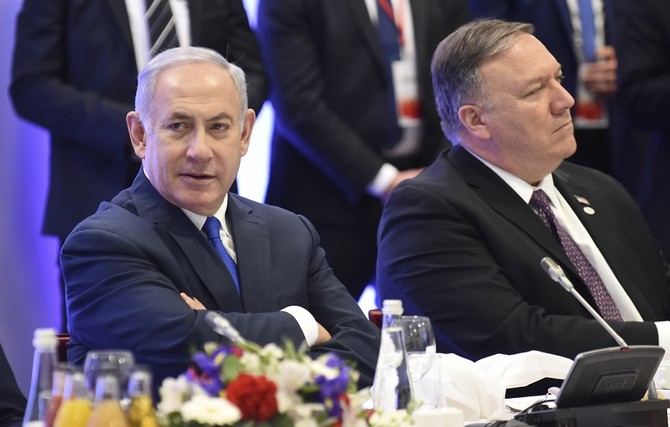WARSAW, Poland: US Secretary of State Mike Pompeo on Thursday called Iran the top threat in the Middle East, and said confronting the country is key to reaching peace in the entire region.
Pompeo, who was attending a security conference in Warsaw, met with Israeli Prime Minister Benjamin Netanyahu before the opening session at the conference. He said “pushing back” against Iran was central to dealing with all the region’s other problems.
“You can’t achieve peace and stability in the Middle East without confronting Iran. It’s just not possible,” Pompeo said alongside Netanyahu.
The Israeli leader lauded the participation of high-profile Arab dignitaries at the conference, saying it marked a “historical turning point” that signaled a shift in regional priorities.
“In a room of some 60 foreign ministers and representatives of dozens of governments, an Israeli prime minister and the foreign ministers of the leading Arab countries stood together and spoke with unusual force, clarity, and unity against the common threat of the Iranian regime,” Netanyahu said.
"I think this marks a change, an important understanding of what threatens our future."
The US and Poland are sponsoring the conference, which they say is aimed at promoting peace and security in the Mideast but appears to be mainly focused on isolating Iran. Iran has denounced the gathering as an American anti-Iran “circus” aimed at “demonizing” it.
But there was condemnation also from Palestine, with Nabil Shaath, adviser to Palestinian president Mahmud Abbas, saying the conference lacked credibility and aimed to “normalize” the Israeli occupation of Palestinian territory.
“By fully siding with the Israeli government, (the Americans) have tried to normalize the Israeli occupation and the systematic denial of the Palestinian right to self-determination,” Shaath wrote in a column published by Israel's Haaretz newspaper.
Trump's son-in-law, Jared Kushner, is expected to offer hints of the US administration's proposals for peace between Israel and the Palestinians.
Shaath said the Palestinians had refused to go to the conference.
“The Warsaw conference is part of this context," he wrote.
"A peace process cannot be turned into an attempt to obtain amnesty for war crimes or to make one of the parties surrender its basic rights under the UN charter."
Palestine has refused to speak to the Trump administration since the US leader recognized Jerusalem as Israel's capital in December 2017.
High profile names such as US Vice President Mike Pence are attending along with representatives from numerous Arab countries.
But France and Germany are not sending Cabinet-ranked officials, and European Union foreign policy chief Federica Mogherini is staying away.
Russia and China aren’t participating, either, and the Palestinians, who have called for the meeting to be boycotted, also will be absent.
For Netanyahu, a longtime opponent of the 2015 Iran nuclear deal, the gathering marks a culmination of his call to unite the world against Israel's arch-enemy of Iran.
He's long boasted that Israel has clandestinely developed good relations with several Arab states, despite a lack of official ties.
On Wednesday, he met with Oman's foreign minister, Yusuf bin Alawi, and at Thursday's opening session he was seated next to the foreign minister of Yemen, as representatives of Kuwait, Qatar and others looked on.
Israel has signed peace accords with Egypt and Jordan, but other Arab nations have refused to publicly improve relations without significant progress made toward ending Israel's half-century occupation of lands sought for a Palestinian state.
That shunning, though, has begun to ease in recent years as shared concerns about Iran have overshadowed the Palestinian issue.
Netanyahu considers Iran to be Israel's greatest threat, citing its frequent calls for Israel's destruction, its nuclear program and support for militant groups across the region. Israel has been active in recent months attacking Iranian targets in neighboring Syria.
The Americans have tried to broaden the scope of what was initially billed as an Iran-centric meeting to include the Israeli-Palestinian conflict, the fight against the Islamic State group, and the conflicts in Syria and Yemen.
“No one country will dominate the discussion today nor will any one issue dominate our talks,” Pompeo said in opening the meeting. He acknowledged that eclectic nature of the gathering could produce views that "may even conflict with those of the United States.”
But he said he welcomed the dialogue since none of the region’s challenges will “solve themselves.” “'We must work together for security. No country can afford to remain on the sidelines,” Pompeo said.
President Donald Trump's senior Mideast adviser, son-in-law Jared Kushner, has been working on an Israeli-Palestinian peace plan for close to two years, but has not yet released details. US officials say Kushner is expected to make some comments in Warsaw about the conflict, but Netanyahu said he doesn’t expect any discussion of the peace plan.
The Palestinians have pre-emptively rejected it, accusing the Trump administration of being unfairly biased toward Israel. Palestinian President Mahmoud Abbas's spokesman Nabil Abu Rdeineh said Thursday that Middle East turmoil will continue unless there is a resolution to the conflict with Israel.
“There will be no peace and stability in the Middle East without a peaceful solution that leads to a Palestinian state with Jerusalem as a capital,” he said.
Pompeo addressed the conference in a closed-door session on US plans for Syria following Trump’s abrupt decision in December to withdraw American troops from the country.
That move led to the resignation of Defense Secretary Jim Mattis and caught many US allies by surprise.
















